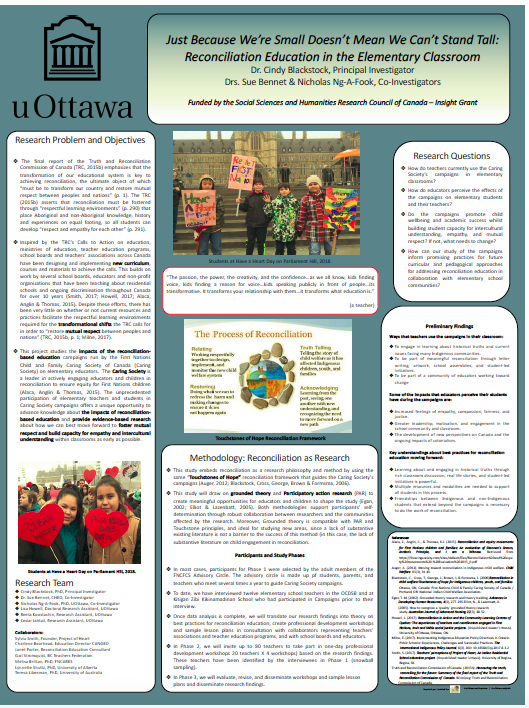Research
Ph.D. Research (2022)
In 2015, the Truth and Reconciliation Commission of Canada (TRC) called on Ministries of Education, Faculties of Education, school administrators, and K-12 teachers to integrate Indigenous knowledges and pedagogies across the school curriculum. The TRC explicitly emphasized that education would be the intergenerational key to reconciliation in Canada and most provinces and territories quickly implemented curricula and developed resources to respond to the Calls to Action. Despite this mandate and these commitments, many teachers and teacher candidates continue to report that they do not have the skills, knowledge, or confidence to teach about the history of the Indian Residential Schooling system, Indigenous knowledges, or reconciliation. Research suggests that teacher resistance to “difficult knowledge” is a crucial contributing factor toward teachers avoiding, ignoring, and dismissing reconciliation work and upholding colonial logics. Moreover, teacher candidates and teachers often rely on the inaccurate and incomplete narratives they have learned about Canadians and First Nations, Inuit, and Métis Peoples. This impacts what and how they teach about these relationships, complicating the transformational changes the TRC urgently called for. How, then, might teachers unlearn these colonial stories and move from learning about Indigenous peoples to learning from them? Drawing on Donald’s concept of “ethical relationality,” this study employed a qualitative approach to conduct conversational interviews with teacher candidates, teachers, staff, and students at two research sites. This study asks, “What are the curricular and pedagogical significances of ethical relationality to processes of unlearning colonialism?” Using a hermeneutic approach to interpret the stories shared, this study weaved within and between the landscapes of home and place. Findings reveal that teachers who experience supportive, multi-layered, and extended opportunities to unlearn settler colonialism and learn Indigenous wisdom traditions and knowledges from Indigenous peoples have the opportunity to understand a new story about Canadian-Indigenous relations. This study suggests that unless teachers begin to unlearn colonial logics, deeply understanding that they are implicated in ethical kinship relations with the places in which they live and with First Nations, Inuit, and Métis peoples, there is a significant possibility that curricula, professional development, and resources will not manifest in the transformational change that the TRC called for.
Click here to read Lisa’s dissertation
Masters Research (2017)
When the Truth and Reconciliation Commission (TRC) called for all provinces and territories in Canada to develop curriculum related to residential schools, most ministries of education began the process of reform. Despite this Call to Action, Quebec remains the only province that has yet to publicly commit to or develop any curricula related to residential schools. In this context, this study examines the Community Learning Centre (CLC) network, which has empowered English schools across Quebec to participate in projects that address the Calls to Action, encouraging social justice and reconciliation. It examines the experiences of teachers and CLC coordinators who have participated in CLC projects between 2012-2016. The findings indicate that there is increasing frustration among teachers concerning the absence of residential school history from the Quebec curriculum. Findings also indicate many pedagogical benefits of teaching for social justice. Finally, the study identifies challenges and best practises, and provides recommendations for program and curriculum development in the movement for reconciliation in education in Quebec.
Just Because We’re Small Doesn’t Mean we Can’t Stand Tall: Reconciliation Education in the Elementary School Classroom
I am the Research Manager on this important three-year, SSHRC-funded project. Dr. Cindy Blackstock is the Principal Investigator. This project is inspired by the Truth and Reconciliation Commission of Canada (TRC) emphasis that the transformation of our educational system is key to achieving reconciliation, the ultimate object of which “must be to transform our country and restore mutual respect between peoples and nations” . The TRC asserts that reconciliation must be fostered through “respectful learning environments” that place Aboriginal and non-Aboriginal knowledge, history and experiences on equal footing, so all students can develop “respect and empathy for each other”. The project is also Inspired by the thousands of children who have participated in the Caring Society campaigns since 2010, including Shannen’s Dream, Jordan’s Principle, and I am a Witness. The project asks the questions: How do teachers currently use the Caring Society’s campaigns in elementary classrooms? How do educators perceive the effects of the campaigns on elementary students and their teachers? Do the campaigns promote child wellbeing and academic success whilst “[b]uilding student capacity for intercultural understanding, empathy, and mutual respect”? If not, what needs to change? What can the current use of the campaigns, and their effects on elementary students and teachers, tell us about best practices for reconciliation education moving forward?

